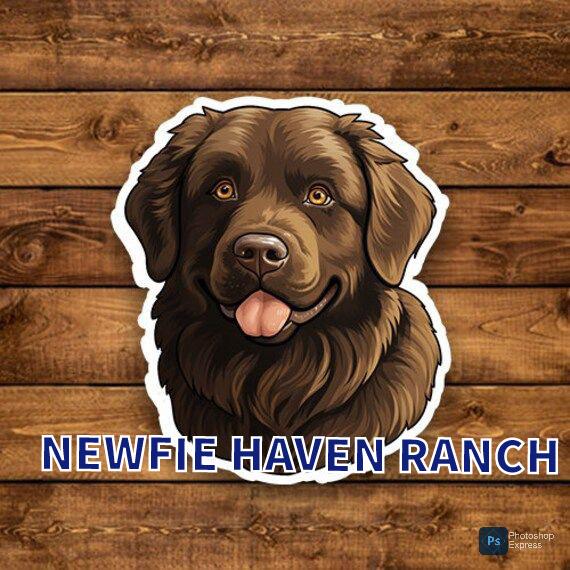Comprehensive Newfoundland Breed Information: A Complete Guide
The Newfoundland dog is a remarkable and beloved breed, known for its incredible strength, gentle temperament, and impressive swimming abilities. If you’re interested in learning more, this Newfoundland breed information guide covers all the essential aspects of the breed—from its history and personality to its care requirements and unique characteristics. Whether you’re considering adding a Newfoundland to your family or you’re simply fascinated by this large, lovable breed, this article will provide you with a complete understanding of what to expect.

Newfoundland Breed Profile
The Newfoundland is a giant dog with a calm, loving disposition. These dogs were originally bred in Newfoundland, Canada, where they assisted fishermen by pulling nets, retrieving items from the water, and performing water rescues. Despite their large size, Newfoundlands are incredibly affectionate and are excellent family pets. They are known for their loyalty, intelligence, and gentle nature.
Newfoundland Breed Size & Height
Newfoundlands are massive dogs, with males typically standing between 28 to 30 inches at the shoulder and females ranging from 26 to 28 inches. Their size and strength make them excellent working dogs, particularly in water-based tasks.
Newfoundland Dog Weight
The weight of a Newfoundland can vary, but on average, these dogs weigh between 100 to 150 pounds. Larger individuals may exceed this range, especially in males. Due to their size, they need ample space to move around comfortably.
Newfoundland Breed Life Expectancy
The average lifespan of a Newfoundland is around 8 to 10 years. However, like all breeds, their health can be influenced by factors such as genetics, diet, and exercise. Regular vet checkups and a healthy lifestyle can help extend their life expectancy.
Newfoundland Breed Traits & Characteristics
Understanding the Newfoundland’s personality and physical traits is essential when considering adding one to your family. Here is a breakdown of the breed’s key characteristics.
Newfoundland Dog Breed Affectionate with Family
Newfoundlands are known for their affectionate nature, particularly toward their family members. They are often referred to as “gentle giants” due to their calm demeanor and loving attitude.

Newfoundlands are Good with Young Children
The Newfoundland’s gentle nature also makes them excellent companions for children. Their patience and tolerance make them ideal family pets. They tend to be especially good with younger kids, enjoying playtime and bonding activities.
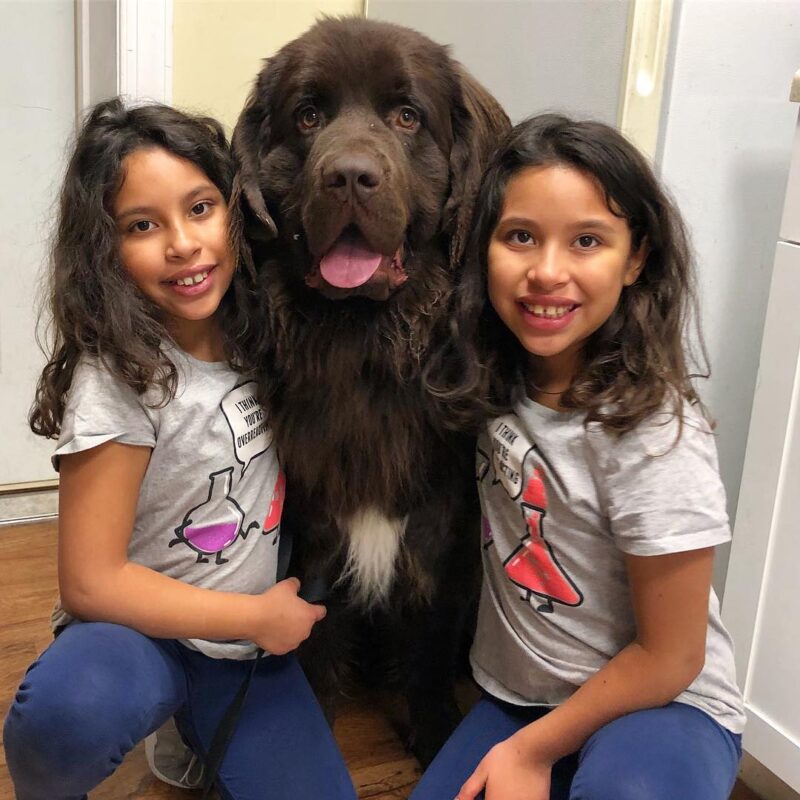
Good with Other Dogs
While Newfoundlands are generally friendly with other dogs, it’s essential to ensure proper socialization from an early age. Properly introduced, they are typically well-behaved and can live harmoniously with other pets.
Newfoundland Dog Breed Shedding Level
Newfoundlands have a thick double coat that sheds moderately throughout the year. They shed more during seasonal changes, particularly in spring and fall. Regular brushing can help manage shedding and keep their coat in good condition.
Newfoundland Dog Breed Coat Grooming Frequency
Newfoundlands require regular grooming to keep their thick coat healthy and prevent matting. Depending on the dog’s activity level and exposure to outdoor elements, grooming should be done at least once a week or more often if needed.
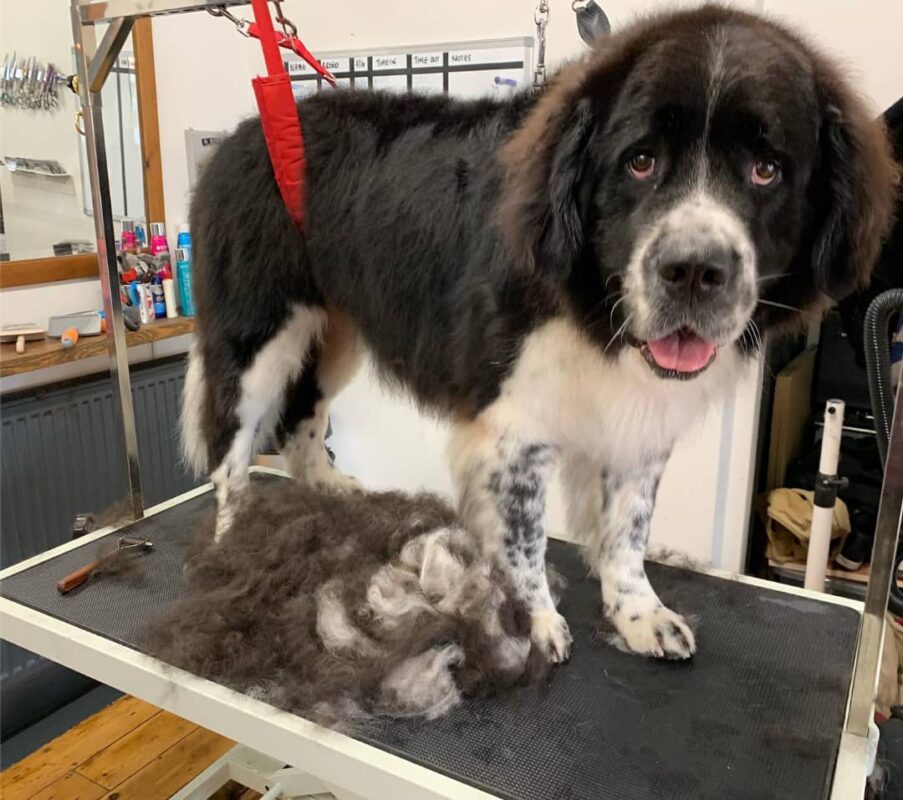
Newfoundland Dog Breed Drooling Level
Newfoundlands are known for their drooling tendencies, especially after eating or drinking. It’s important to have plenty of towels handy to clean up drool, particularly with the breed’s large jowls.
Newfoundland Dog Breed Coat Type & Length
The Newfoundland’s coat is thick, water-resistant, and insulating. Their fur helps protect them from cold weather and water-related tasks. The coat is typically medium to long in length, and it often requires regular brushing to prevent tangles and matting.
Newfie Dogs Openness to Strangers
Newfoundlands are generally friendly with strangers but can be reserved at first. They have a strong protective instinct, especially toward their family members. Early socialization can help them become more comfortable with unfamiliar people and situations.
Newfoundland Dog Playfulness Level
Despite their size, Newfoundlands are playful and enjoy activities with their family members. They love swimming, playing fetch, and even performing water-related tasks. Their playful nature makes them great companions for active families.
Newfie Dogs have a Watchdog/Protective Nature
While Newfoundlands are not aggressive, they are naturally protective of their family. They make good watchdogs, alerting their owners to unfamiliar visitors or potential dangers. However, they are usually calm and not prone to excessive barking.
Newfoundland Dog Breed Adaptability Level
Newfoundlands are adaptable dogs that can adjust to various living environments, though they do best in homes with plenty of space. They can live in apartments or smaller homes as long as they receive sufficient exercise and attention.
Newfoundland Dog Breed Trainability Level
Newfoundlands are intelligent and trainable, though they can sometimes be independent. Early training and positive reinforcement techniques work best with this breed. Their natural intelligence and desire to please make them relatively easy to train for various tasks, including obedience and water rescue work.
Newfoundland Dog Energy Level
While Newfoundlands are generally calm dogs, they do require regular exercise to stay healthy and fit. Their energy levels are moderate; they enjoy daily walks, swims, and play sessions, but they are not hyperactive.
Newfoundland Dog Breed Barking Level
Newfoundlands are not typically known for excessive barking. They may bark to alert their family of a visitor, but they are generally quiet and calm in the home.
Newfoundland Dog Mental Stimulation Needs
Newfoundlands are highly intelligent and benefit from mental stimulation to keep them engaged. Puzzle toys, training sessions, and regular problem-solving activities can help keep their minds sharp and prevent boredom.
The Newfoundland Coat Colors & Markings
Newfoundlands come in a variety of stunning coat colors. The most common colors include black, brown, gray, and Landseer (white with black or brown markings). These color variations add to the breed’s visual appeal and give each dog a unique look.
Black Newfoundland
The black Newfoundland is the most common and widely recognized color. These dogs have a sleek, shiny black coat that is easy to maintain with regular grooming.

Brown Newfoundland
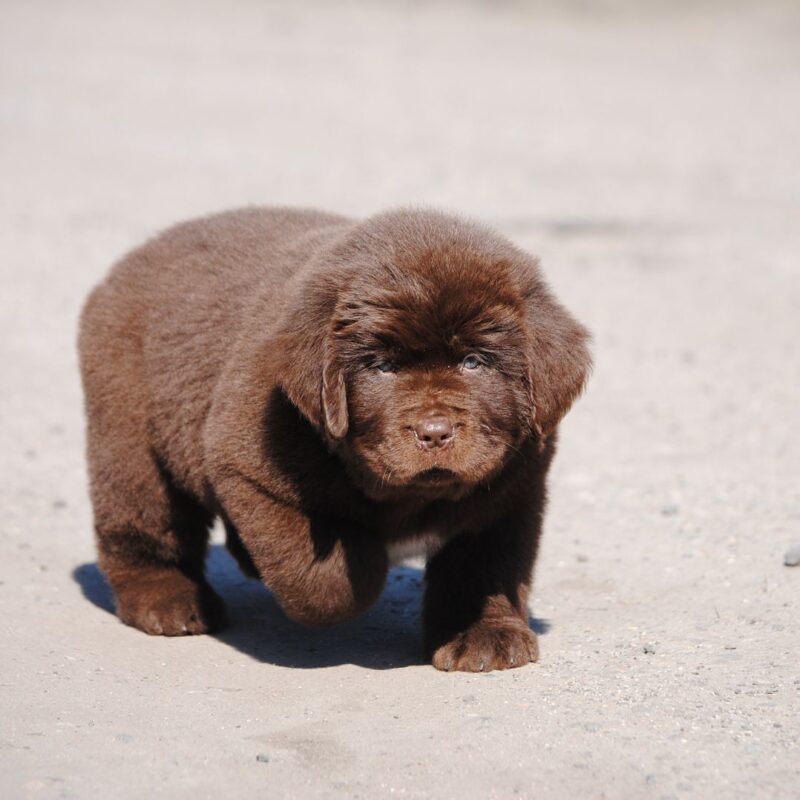
Brown Newfoundlands feature a rich, chocolate brown coat. These dogs are admired for their elegant appearance and are often considered a rarer color within the breed.
Landseer Newfoundland
The Landseer Newfoundland is a variation of the breed that features a predominantly white coat with black (or brown) markings. These dogs are often larger and have a distinctive appearance due to their coloring.

Gray Newfoundland
Gray Newfoundlands have a soft, smoky-colored coat that gives them a gentle, dignified look. They are less common than black Newfoundlands but still highly sought after.
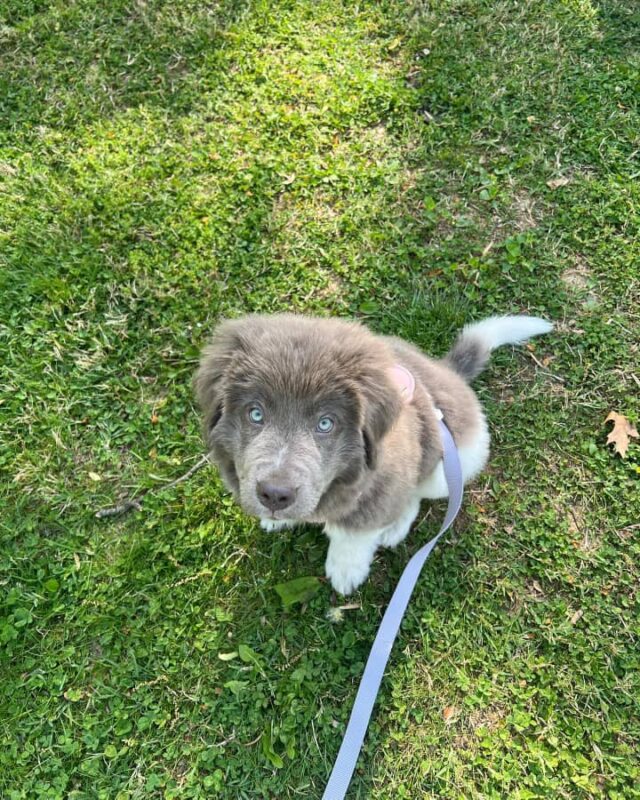
What to Expect When Caring for a Newfoundland
Caring for a Newfoundland requires dedication and attention. Here are some essential tips for prospective owners:
Newfoundland Breed Health
Newfoundlands are generally healthy dogs but are prone to specific health conditions, such as hip dysplasia, heart problems, and obesity. Regular veterinary checkups, a healthy diet, and proper exercise can help keep them in good health.
Newfound Dog Breed Grooming
As mentioned earlier, Newfoundlands require regular grooming to manage their thick, double coat. Brushing a few times a week will help prevent matting, while occasional baths will keep their coat clean.
Newfound Dog Breed Exercise
Newfoundlands are moderately active dogs that enjoy regular walks and swimming sessions. They are also known for their love of playing in the water, making them a great choice for families who enjoy outdoor activities.
Newfound Dog Breed Training
Training your Newfoundland is crucial to ensure they are well-behaved and obedient. Early socialization and positive reinforcement are essential for developing a strong bond and ensuring they grow up to be well-mannered pets.
Newfound Dog Nutrition
Providing proper nutrition is vital for maintaining your Newfoundland’s health. Choose high-quality dog food designed for large breeds to support their unique needs. Make sure they maintain a healthy weight to reduce the risk of joint problems and other health concerns.
Finding Newfoundland Puppies
If you’re considering adopting a Newfoundland puppy, it’s important to find a reputable breeder who prioritizes health and temperament. Research breeders, ask for references, and ensure that they follow ethical breeding practices to ensure you’re getting a healthy and well-socialized pup. Also the breeder should be able to provide Newfoundland breed information
Conclusion
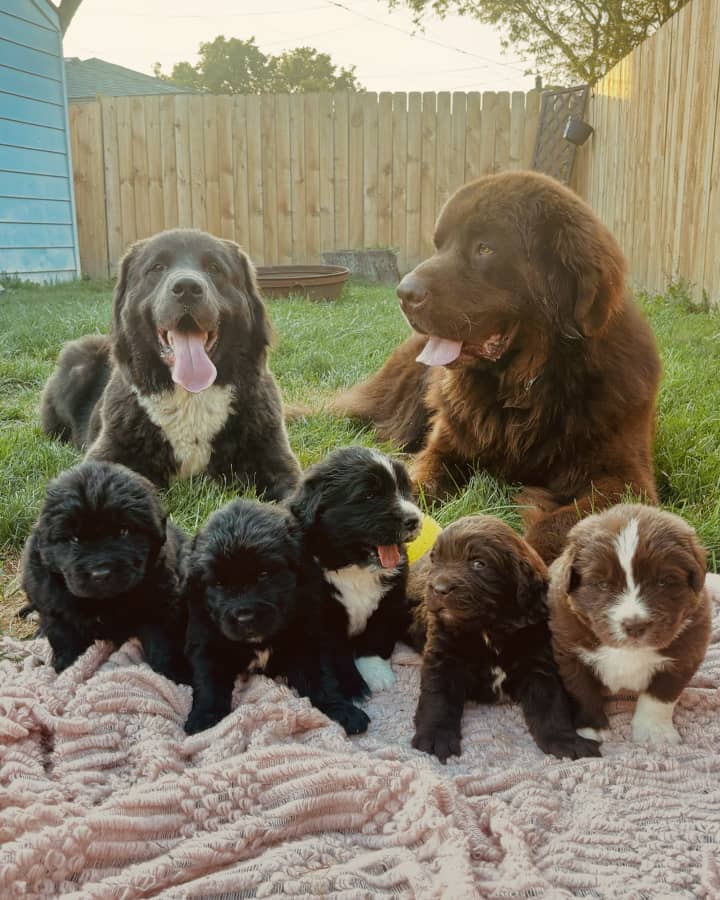
In conclusion, Newfoundland breed information highlights the breed’s gentle nature, impressive physical characteristics, and suitability as a family companion. Whether you’re drawn to their beautiful coat, calm demeanor, or intelligence, Newfoundlands make wonderful pets for the right families. By understanding their grooming, training, and exercise needs, you can ensure that your Newfoundland has a happy, healthy life. Bellow are similar related topics to Newfoundland breed information;
More About Newfoundland Dogs
–Newfoundland Puppies| Available Now |
–Newfoundland Landseer Puppies for Sale
-Newfoundland Dog Health Issues
-The Brown Landseer Newfoundland
-The Newfoundland Family Tree: Exploring Bloodlines and Pedigree
-Newfoundland Dog Health Issues
-The Brown Landseer Newfoundland
-Newfoundland Dog FAQ | Most Asked Questions About Newfoundland Dogs
